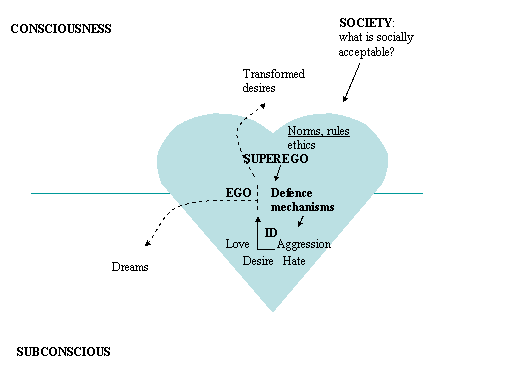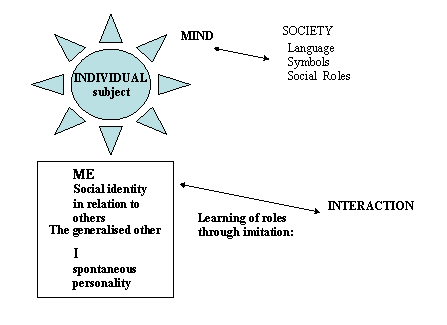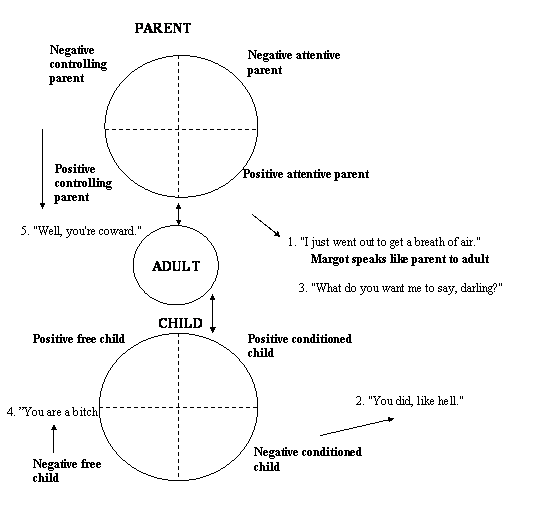THEMES:
SOCIAL INTERACTION AND EVERYDAY LIFE
NON-VERBAL COMMUNICATION
GENDER SOCIALIZATION
 |
Freud's model of personality In the story below we see that Francis Macomber has a subconscious wish to be a strong man (the id). Actually, he is afraid of the lion and dreams of it at night (dreams: language of the subconscious). He is also afraid of Margot cheating on him. When she actually does so, he reacts by being aggressive (You are a bitch), but also by pleading with her: There wasn't going to be any of that. You promised there wouldn't be - thus appealing to her superego, the social norms. She uses a number of defence mechanisms, like pretending to "forget it"/repress it: Please let's not talk. I"m so sleepy, darling. But also by rationalization: He is a coward so she has a "right" to make him a cuckold. |
VOCABULARY
| Socialization | Learning social roles and norms while adapting to the social environment |
| Gender | Sex (køn) refers to physical differences of the body, gender (køn) to social and cultural differences between males and females |
| Communication | For instance conversation, telling a story to somebody, etc. |
| Interaction | Social interaction = People acting together, for instance having a conversation, in a social environment |
| Face-to-face Interaction | Interaction in primary groups where people speak to each other face to face |
| Interaction Ritual | When you act in a conformist way, repeating acts according to the same "rules". Interaction ritual is the rules governing such behaviour |
| Role | Social expectations to a position in a group |
| Social Norm | Social rule |
| Impression management | The acts of making others react to you in ways you want |
| Front stage | The part of the stage where the social actor is close to the audience |
| Back stage | |
| Primary group | A group with face-to-face communication, for instance the family |
| Secondary group | A group with less face-to-face communication, for instance a school |
| FROM:
The Short Happy Life of Francis
Macomber by Hemingway In this story Hemingway gives an account of a couple on a safari in Africa. Francis Macomber finds it difficult to live up to the expectations of being a brave and efficient lion hunter. His wife Margot cheats on him. .... They had a sound basis of union. Margot was too beautiful for Macomber to divorce her and Macomber had too much money for Margot ever to leave him. It was now about three o'clock in the morning and Francis macomber, who had been asleep a little while after he had stopped thinking about the lion, wakened and then slept again, woke suddenly, frightened in a dream of the bloody-headed lion standing over him, and listening while his heart pounded, he realized that his wife was not in the other cot in the tent. He lay awake with the knowledge of two hours. At the end of that time his wife came into the tent, lifted her mosquito bar and crawled cozily into bed. "Where have you been?" Macomber asked in the darkness. "Hello," she said. "Are you awake?" "Where have you been?" "I just went out to get a breath of air." "You did, like hell." "What do you want me to say, darling?" "Where have you been?" "Out to get a breath of air." "That's a new name for it. You are a bitch." "Well, you're coward." "All right," he said. "What of it?" "Nothing as far as I'm concerned. But please let's not talk, darling, because I'm very sleepy." "You think that I'll take anything." "I know you will, sweet." "Well, I won't." "Please, darling, let's not talk. I'm so very sleepy." "There wasn't going to be any of that. You promised there wouldn't be." "Well, there is now," she said sweetly. "You said if we made this trip that there would be none of that. You promised." "Yes, darling. That's the way I meant it to be. But the trip was spoiled yesterday. We don't have to talk about it, do we?" "You don't wait long when you have an advantage, do you?" "Please let's not talk. I"m so sleepy, darling." "I'm going to talk." "Don't mind me then, because I'm going to sleep." And she did. At breakfast they were all three at the table before daylight and Francis Macomber found that, of all the many men that he had hated, he hated Robert Wilson the most. "Sleep well?" Wilson asked in his throaty voice, filling a pipe. "Did you?" "Topping," the white hunter told him. You bastard, thought Macomber, you insolent bastard. So she woke him when she came in, Wilson thought, looking at them both with his flat, cold eyes. Well, why doesn't he keep his wife where she belongs?" What does he think I am, a bloody plaster saint? Let him keep her where she belongs. It's his own fault. |
1. Use the Freudian method for analysing some pieces of literature (e.g.
link to the right)
2. Why does Francis Macomber hate Wilson so much? Is it because he loves his
wife and therefore is jealous?
3. What are the shortcomings of the Freudian model of personality?
 |
MEAD'S MODEL OF PERSONALITY Francis Macomber's "Me" is his preconceived notion of himself as a social success, a man who goes on a safari with his wife and kills a lion. This image cracks when he displays some cowardly behaviour when confronted with an actual lion. In the passage above his "I", the spontaneous part of his personality, surfaces, when he discusses the act of adultery with his wife and with Wilson.
|
 |
GAME THEORY The American Eric Berne (Games People Play) defined a social game as a series of interactions (words, body language, facial expressions) between two or more people that follow a predictable (forudsigelig) pattern. The interactions move on to an outcome in which one individual gets a "payoff" (belønning) or "goal." In most cases, the participants of the games are unaware that they are "playing." In his theoy of communication Berne was influenced by the Freudian model, when he divided the personality into layers (inner parent, child and adult) and said that we communicate with others by letting thes different layers interact through the conversation. Macomber by being jealous reacts as a child. At first Margot tries to handle it by reasoning with him (talking like an adult to him). When he does not react positively to this she changes into "controlling parent". |
Grammar exercise: Put in the right forms of the verbs (read about the rules here) in the following text (past tense):
"Can_____ I have a drink of water?" Macomber ask______. Wilson
speak_______ to the older gun-bearer, who wear_______ a canteen on his belt,
and the man unbuckle_________ it, unscrew_________ the top and hand_________
it to Macomber, who take__________ it noticing how heavy it seem_________
and how hairy and shoddy the felt covering be________ in his hand. He raise_________
it to drink and look__________ ahead at the high grass with the flat-topped
trees behind it. A breeze blow__________ (expanded tense) toward them
and the grass rippl________ gently in the wind. He look________ at the
gun-bearer and he can________ see the gun-bearer suffer_________ (expanded
tense) too with fear.
Thirty-five yards into the grass the big lion lie________ flattened out
along the ground. His ears be_______ back and his only movement be________ a
slight twitching up and down of his long, black-tufted tail. He turn_________
(pluperfect) at bay as soon as he reach_________ (pluperfect)
this cover and he be________ sick with the wound through his full belly, and
weakening with the wound through his lungs that bring________ a thin foamy
red to his mouth each time he breathe________. His flanks be______ wet and
hot and flies be________ on the little openings the solid bullets make________
(pluperfect) in his tawny hide, and his big yellow eyes, narrowed
with hate, look_________ straight ahead, only blinking when the pain come________
as he breathe______, and his claws dig_________ in the soft baked earth. All
of him, pain, sickness, hatred and all of his remaining strength, tighten_____
(expanded tense) into an absolute concentration for a rush. He can______
hear the men talking and he wait______, gathering all of himself into this
preparation for a charge as soon as the men will______ come into the grass.
As he hear_______ their voices his tail stiffen________ to twitch up and
down, and, as they come________ into the edge of the grass, he make_______ a
coughing grunt and charge_________.
Kongoni, the old gun-bearer, in the lead watching the blood spoor, Wilson
watching the grass for any movement, his big gun ready, the second
gun-bearer looking ahead and listening, Macomber close to Wilson, his rifle
cocked, they just move________ (pluperfect) into the grass when
Macomber hear_____ the blood-choked coughing grunt, and see_______ the
swishing rush in the grass. The next thing he know________ he run_______ (expanded
tense); running wildly, in panic in the open, running toward the stream.
He hear________ the ca-ra-wong! of Wilson's big rifle, and again in a second
crashing carawong! and turning see______ the lion, horrible-looking now,
with half his head seeming to be gone, crawling toward Wilson in the edge of
the tall grass while the red-faced man work_______ the belt on the short
ugly rifle and aim_______ carefully as another blasting carawong! come_______
from the muzzle, and the crawling, heavy, yellow bulk of the lion stiffen_______
and the huge, mutilated head slide_______ forward and Macomber, standing by
himself in the clearing where he run________ (pluperfect), holding a
loaded rifle, while two black men and a white man look_____ back at him in
contempt, know________ the lion be_______ dead.
Expanded tense: Udvidet tid - he was reading a book when I
saw him
Pluperfect: Førdatid: He had read a book.
Comment on the expanded tenses in the text. Why does the author use
expanded tense those places?
KONGRUENS (Read about Kongruens here. Teksten er i nutid):
"Chances be_______ he'll come to drink along here," Wilson whisper_______.
Before he go______ to lay up. Keep an eye out."
They be_______ driving slowly along the high bank of the stream which here
cut_____deeply to its boulder-filled bed, and they wind______ in and out
through big trees as they drive______. Macomber be______ watching the
opposite bank when he feel_____ Wilson take hold of his arm. The car
stop______.
"There he is," he hear______ the whisper. "Ahead and to the right. Get out
and take him. He be______ a marvelous lion."
Macomber see_____ the lion now. He be_____ standing almost broadside, his
great head up and turned toward them. The early morning breeze that blow_____
toward them be_____ just stirring his dark mane, and the lion look_____ huge,
silhouetted on the rise of bank in the gray morning light, his shoulders
heavy, his barrel of a body bulking smoothly.
"How far be_______ he?" ask_____ Macomber, raising his rifle.
"About seventy-five. Get out and take him."
"Why not shoot from where I be_______?"
"You do_____ not shoot them from cars," he hear______ Wilson saying in his
car. "Get out. He be______ not going to stay there all day."
The Ice Palace
Games people play